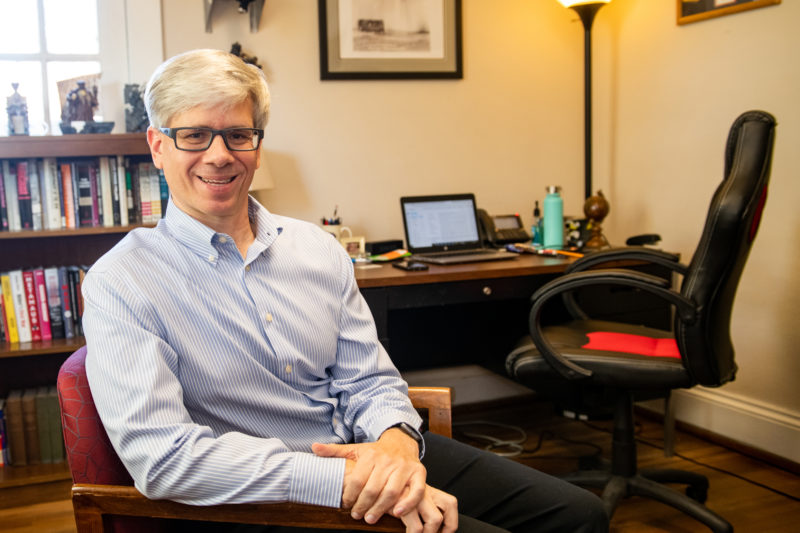
Over the past few months, Dr. Brian Crim, a University of Lynchburg history professor, has been working with TED-Ed to make a video about Project Paperclip, the subject of his 2018 book, “Our Germans: Project Paperclip and the National Security State.”
The book, which tells the true story of the controversial intelligence program that brought engineers, scientists, and technicians to the U.S. from former Nazi Germany, has been featured on C-SPAN’s “Book TV.”
Crim and the book were consulted in creating a storyline for “Hunters,” a fictional TV series about Nazi hunters in 1970s New York City. “Our Germans” also was translated into Chinese, which Crim said is “pretty rare for an American history book.”
This past summer, “Our Germans” caught the attention of TED-Ed, a branch of TED, which is perhaps best known for its popular TED Talks. TED-Ed videos — TED calls them “lessons worth sharing” — are shorter than TED Talks and animated for a younger audience.
“[Someone at TED-Ed] read my book ‘Our Germans’ — the one that people apparently read,” Crim said, joking. “They approached me and said, ‘We’d like to do a TED-Ed on Paperclip. We’d like you to write the script and participate in being part of the production.’”
Crim wrote several drafts of the script and consulted with animators on the video’s storyboard. He received what he describes as a “modest fee” for his work, but said collaborating with TED-Ed was less about money and “more about me translating my work for a general audience,” which includes schoolkids.
“They asked me to write a script of approximately 1,000 words for an educated-but-not-expert group of people on my topic,” Crim said in October. “Relatively plain language, covers the real significance of the events. The details should be interesting.
“The first thing they want is a hook that will get people interested from off the bat: Wernher von Braun’s daring escape — how he escaped from the Third Reich into the hands of the Americans.”
Crim also developed educational materials for TED-Ed, including what he called a “dig-deeper section,” discussion questions, and a list of other resources about Paperclip and von Braun, who was one of Paperclip’s German scientists.
“It’s a great way to reach a much bigger audience on historical topics that aren’t very well known. It’s the appeal of TED-Ed,” Crim said. “Some queen that you never heard of, a massacre. They’re really good at taking lesser-known topics and making them much more available and well-known to an audience, and I like being a part of that.”
One aspect of the story Crim emphasized in both his book and the TED-Ed project was that Paperclip was a “controversial and sordid program,” and that some people were reluctant to hire ex-Nazis to work on classified U.S. defense projects like satellites, missiles, and rockets.
“The U.S. was wrestling with a moral dilemma here,” Crim said. “Do you hire or use Nazis for your own national security, knowing that they’re inherently dangerous and immoral people? I wanted to highlight that it wasn’t a clear-cut decision. Lots of voices opposed it.
“People think of the space race and Wernher von Braun and all the cultural references to it, but people aren’t aware of how contentious it was and I wanted that to come through.”
One bonus of Crim’s collaboration with TED-Ed was that he managed to impress his middle-school-aged daughter. “It’s the only thing she’s ever been excited about that I’m doing,” he said. “She watches them in class, about seashells or insects or history.
“She’s definitely aware of TED-Ed — was more aware of it than I was.”
When finished, Crim’s video — one of about 150 shorts TED-Ed produces each year — will be about 5 minutes long. It’s expected to be released next spring.
“In the first month, they tend to get about 20,000-40,000 views,” said Dan Kwartler, senior editorial producer at TED-Ed. “Over the course of the first year of publication, most lessons will get to about a million views, some way more, some less.”
Crim is already in preliminary talks with TED-Ed about collaborating on a video specifically about von Braun. “They said, ‘You’re so fascinated by Wernher von Braun that we might do a second one about just him,’” he said.
“I agreed to do that as well. They saw a lot of promise in the story to get a lot of hits. It’s in the works, but I have to get through this one first.”
As for Kwartler, he and his team are always happy to work with educators like Crim who are “effusively knowledgeable” about a subject. “Our team has a term, where we have a ‘joyous nerd,’ someone who’s so deep into what they do, but tells great stories and has tons of information to share,” he said.
“It’s no surprise, having written ‘Our Germans,’ that he’d already thought about how to tell this story. He came prepared with some cool ideas for the introduction — one of the hardest things. He was already ready for it.
“And throughout the process it was the same. Honestly, this piece came together pretty quickly.”

